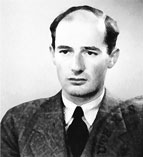P.O.V.: The lessons of Raoul Wallenberg
P.O.V.: The lessons of Raoul Wallenberg McGill University
User Tools (skip):
POV
The lessons of Raoul Wallenberg
Raoul Wallenberg, the Second World War-era Swedish diplomat whom the United Nations called "the greatest humanitarian of the 20th century," was the embodiment of the Talmudic and Islamic adage that whoever saves a single life, it is as if they have saved an entire universe.
This lost hero of the Holocaust confronted the Nazi killing machine in Hungary and showed that one person can make a difference; that one person can resist; that one person can prevail over radical evil. Wallenberg's incredible heroism included:

-
The granting of Shutzpasses—diplomatic passes that provided protective immunity—to Jews at risk in Budapest. He also influenced other governments to follow his example.
-
The establishment of protective havens in Budapest—the "international ghetto" as it came to be called. With this initiative alone, some 32,000 people were saved.
-
The rescue of thousands from deportation and death in October, 1944, when Hungary's Arrow Cross Nazi puppet government unleashed a wave of murderous deportations and atrocities. He provided Shutzpasses to remove people from trains that were about to deport them to certain death.
-
In November, 1944, as thousands of Jews, mainly women and children, were sent on a 125-mile death march, Wallenberg followed, distributing food, medical supplies, and improvised documents.
-
As the Nazis were advancing on Budapest late in the war, threatening to liquidate the remnants of some 70,000 Hungarian Jews, Wallenberg put the Nazi generals on notice that they would be brought to justice for their war crimes. They desisted and tens of thousands were saved.
To the Jews, Wallenberg was a guardian angel.
To Adolph Eichmann, desk murderer responsible for the Final Solution of Jews in Hungary and elsewhere, Wallenberg was the Judenhund Wallenberg, the "Jewish dog."
In his protection of civilians during armed conflict, he symbolized the best of the human spirit. In his warnings to the Nazis, which foreshadowed the Nuremberg principles that would emerge following the war, he epitomized something else, too: the mechanisms of humanitarian law.
Raoul Wallenberg was not only a great humanitarian. He taught us that we each have an indispensable role to play in the struggle for human rights and dignity.
We must remember always that human rights begin with each of us—in our homes, in our workplaces, in our human relations, in our daily acts of caring and compassion, in our daily capacity to make life better for victims of discrimination or disadvantage.
This then must be our task: to speak on behalf of those who cannot be heard; to bear witness on behalf of those who cannot testify.
We need to live human rights, to become the individual implementers of international human rights law. That is what the protection of human security is all about.
Prof. Irwin Cotler is M.P. for Mount Royal and a former Minister of Justice and Attorney General of Canada. He is a professor of law (on leave) at McGill and served as chairman of the International Commission on the Fate and Whereabouts of Raoul Wallenberg. He delivered the inaugural Raoul Wallenberg Human Rights Lecture on Jan. 17 at the McGill Faculty of Law. This piece is abridged from one that ran in the National Post Jan. 17.

